Template:Civil religion: Difference between revisions
No edit summary |
No edit summary |
||
| Line 6: | Line 6: | ||
This ''civil religion'' is "also known as ''civic piety'', ''religious nationalism'', ''public religion'', and the common faith, civil religion provides a religious sanction for the political order and a divine justification of and support for civic society and a nation's practices."<Ref>[http://www.christianitytoday.com/history/issues/issue-99/civil-religion-in-america.html Civil Religion in America] GARY SCOTT SMITH </Ref> also called [[civil religion]],<Ref>American civil religion. ... American civil religion is a sociological theory that a nonsectarian quasi-religious faith exists within the United States with sacred symbols drawn from national history. Scholars have portrayed it as a cohesive force, a common set of values that foster social and cultural integration.</Ref> is not that different than the public religion of ancient Rome. | This ''civil religion'' is "also known as ''civic piety'', ''religious nationalism'', ''public religion'', and the common faith, civil religion provides a religious sanction for the political order and a divine justification of and support for civic society and a nation's practices."<Ref>[http://www.christianitytoday.com/history/issues/issue-99/civil-religion-in-america.html Civil Religion in America] GARY SCOTT SMITH </Ref> also called [[civil religion]],<Ref>American civil religion. ... American civil religion is a sociological theory that a nonsectarian quasi-religious faith exists within the United States with sacred symbols drawn from national history. Scholars have portrayed it as a cohesive force, a common set of values that foster social and cultural integration.</Ref> is not that different than the public religion of ancient Rome. | ||
What was the meaning of the word [[religion]] now and in the past? | |||
What would be the difference between [[private religion]] and [[public religion]]? | What would be the difference between [[private religion]] and [[public religion]]? | ||
Revision as of 11:21, 4 September 2018
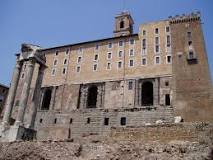
Public religion
The "... sociologist Robert Bellah[1] argued that the United States had "an elaborate and well-instituted civil religion," which existed "alongside of" and was "rather clearly differentiated from the churches."
This civil religion is "also known as civic piety, religious nationalism, public religion, and the common faith, civil religion provides a religious sanction for the political order and a divine justification of and support for civic society and a nation's practices."[2] also called civil religion,[3] is not that different than the public religion of ancient Rome.
What was the meaning of the word religion now and in the past?
What would be the difference between private religion and public religion?
"Public" may be defined as "of or concerning the people as a whole" but it really means "of or concerning the people as a group" like a nation under a government or an authority.
Religion was originally not exclusively about theology or even "Natural Theology". The meaning of the word Religion has changed over the centuries. Theology is a study while religion was originally a performance of a duty.
The Bible mentions religion more often in a bad sense and only speaks of it in a good sense when it mentions Pure Religion. Since the term "religion" has shifted from meaning a performance of a duty to an opinion about God it is not only good to couple a modifier word to determine what kind of religion you are talking about but it is often essential to maintaining an understanding the topic like public religion.
- "Romans... distinguished between public and private religion. When the distinction between public and private religion is applied to the Roman emperors, it becomes clear that many of them pursued personal religious interests in addition to their public religious role." [4]
The Latin term religare meaning “to tie, to bind.” Since the performance of religious duties bound the people of society together through a process of service and kindness producing a spirit of brotherhood and community the practices of public religion often had to do with securing loyalty and even allegiance to those who sat in the place of authority over the public religion.

Understanding that Religion practiced as a duty to provide welfare for your fellow man divides Public religion and private religion into welfare by the exercise of authority by the state and the charitable practices of the people through voluntarism.
Rousseau suggests that Christianity is other-worldly, and therefore takes away from citizens' love for life on earth as exemplified by the state. But that was a conclusion drawn from his observation of a neglectful Church already in apostasy. Rousseau explains, "Christianity is a wholely spiritual religion, concerned solely with the things of heaven; the Christian's homeland is not of this world." But the kingdom of God was on this planet, taken from the Pharisees, and appointed to the little flock. That little flock was the called out Church directed to be another form of government that did not exercise authority one over the other. It was simply not of the "world" of Rome but of the world of the early Church insituted by Christ.
Bellah, Smith, V, and many others today forget that the early Church provided a daily ministration to the people which was not "wholely spiritual religion, concerned solely with the things of heaven" and brought them into conflict with Rome and its system of free bread for which they were persecuted.
Public religion can refer to both a civic faith within a government control and to public expressions of that faith in cultures. Public religion, if we use the definition of Religion meaning how we care for the needy of society, is the same as public welfare. The early Christian Church was often persecuted because at that time Pure Religion was actually private religion or Private welfare. In fact the outlawing of Private welfare by Rome was at the center of the Christian conflict with the Benefactors of Rome. Christians were in the World of Rome but not of the World of Rome.
They did not apply for the Free Bread of Rome nor were they members of the Imperial Cult of Rome because they knew that was a Covetous practice that would make them Merchandise, a surety for the debt of the welfare State of Rome and would curse their children with that debt.
Public religion is also related to Civil religion which is a concept that originated in French political thought and became a major topic for American sociologists in the 1950s.
Civil religion means the implicit religious values of a nation, as expressed through public rituals, symbols (such as the national flag) and ceremonies on sacred days and at sacred places (such as monuments, battlefields or national cemeteries). It stands outside the churches, although church officials and ceremonies are sometimes incorporated into the practice of civil religion.
The phrase "civil religion" as discussed by Jean-Jacques Rousseau in his 1762 treatise The Social Contract was defined as a group of universal religious beliefs. He believed governments had a responsibility to uphold and maintain the right of the individual belief in a deity, that virtue is rewarded and vice punished and belief in religious tolerance. Rousseau affirmed that individuals' religious opinions should be beyond the reach of governments.
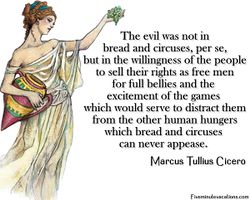
To define Public religion it is important to define the term Religion because it changes from time to time in the history and mind of society. Religion may be defined as what you think about a God or gods but at other times religion is defined as your duty to your God and your fellowman. When personal conscience is dictating that duty we call that private religion but when the government dictates that duty we are talking about Public religion.
Where there is religious freedom the practice of religion and the performance of those duties to both God and your fellowman remain available as a private affair rather than a public affair and therefore would not subject to public policy unless private religious practice obstructs the free practice of religion by others.
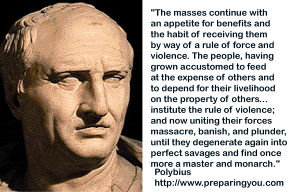
Public affairs may included more than the original duties of government which are often limited to constitutions of the people who create them. The Constitution of United States limited the power of government from meddling in the free practice of religion as defined at the time of that Constitution's acceptance and implementation.
Public affairs may also include social benefits and the collection of the funds to provide those benefits. Rome moved from private religion funded by charity which took care of the needy to Public religion funded by taxes. The Romans used the same names and temples but altered the method of contribution and distribution. That meant records of members and who has paid in and what is paid out.
Members received entitlements in the form of "gifts, gratuities and benefits"[9] but also had a civic obligation of support the system imposed by law. Under the Public religion of Rome Augustus became the pontifex maximus (chief priest). From that point on the Emperor of Rome provided the social welfare run through the state system of temples in a form of Public religion, The Imperial cult of ancient Rome.
This practice increased the power of the state and the dependence of the people. Social welfare was managed through their temples like Ephesus, Temple of Saturn and the Parthenon. Saturn was the god of agriculture which housed the records needed by the government and beneficiaries of its systems of welfare including birth certificate.
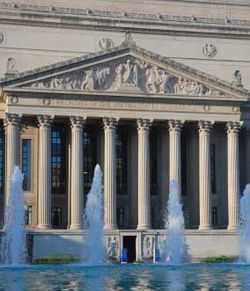
The first building for maintaining public records in Rome, including the law, was erected under the protection of the temple of Saturn, as early as 509 B.C. but was possibly burned by the Gauls in 309 B.C. Other buildings were used until 78 B.C. when they built the great Tabularium, on Capitoline Hill, below the Temple of Jupiter, which was the symbol of the sovereignty and power of Rome.
Civic faith includes an aspect of civic allegiance and depends upon Civil law to impose both. It includes both a civic duty and benefit. Private religion
The 2nd century A.D. text 'De Significatione Verborum' of Sextus Pompeius Festusgives distinguishes public and private religion. The former is carried out at public expense either on behalf of the populus as a whole or individual members of the populus who met certain criteria. Private individuals could contribute to the temples and festivals which at one time depended entirely upon donation by the people for the people.
The latter called private religion was almost always on the behalf of individuals, familiae and gentes. These Family groups gathered in a network of hearths in early Rome and were served by chosen individuals who connected these groups from a grass roots union of voluntary loyalty and honor in charity to their fellow man.
Later this practice of private religion through free will sharing according to what the individual believed that the gods or God wanted them to do began to become more controlled. First certain groups like collegiae, guilds and sodalities provided for their own but then temples became more enterprising and collective. Eventually with the centralization of power in government, first in the Senate and then in an Emperor and Principas Civitas, private religion became less essential in forming the bonds of society and Public religion through the civil authorities and registration of citizens began to dominate public services altering the very nature of society.
Civic faith more recently was expressed by men like Benjamin Franklin who in 1749 proposed an educational academy in Philadelphia. He believed that the study of history would "afford frequent Opportunities of showing the Necessity of a Publick Religion ," arguing "from its Usefulness to the Publick; the Advantages of a Religious Character among private Persons." But undoubtedly Ben was including the moral charcter required in the performance of religion and that it should be incorporated in public affairs.
Religion was at that time chiefly the performance of your duty to God and your fellowman and not merely your opinion of who God is.
Civil Religion is mentioned in the Social Contract[10] by Jean-Jacques Rousseau who switched from protestant to Catholic and back again depending on which women he was in love with at the time. He suggested that a Christian Republic was paradoxical imagining that Christianity taught submission. He knew that it did not promote participation in public religion.
In Gibbon’s Decline and Fall of the Roman Empire, he praised “the union and discipline of the Christian republic.” He also pointed out that “it gradually formed an independent and increasing state in the heart of the Roman Empire.”Rousseau and Revolution, Will et Ariel Durant p.801. fn 83 Heiseler, 85.
The bloody conflict between the religions (in the sense of an opinion about God) of the fifteenth through the seventeenth century focused the attention and imagination of men on the ideology of religion and opinions about God leaving off the weightier matter of the performance of your duty to your fellowman with righteous intent. The idea of a theocracy still strikes fear in the hearts of men.
These conflicts were the result of the people giving to much power and wealth to their clerics and the encroachment of superstitions rather than duty as the primary focus of religion.
Émile Durkheim[11], a collaborator with Karl Marx and Max Weber, redefined religion again:
- "A religion is a unified system of beliefs and practices relative to sacred things, i.e., things set apart and forbidden--beliefs and practices which unite in one single moral community called a Church, all those who adhere to them." [12]
His ideas struck many as representing a kind of "top-down" governmental development and control of religion and making the State the god of religion as we see him avoiding the supernatural or even God all together in his definition.
Of course Émile, as a sociologist, was in his head a lot about things like religion imagining that they were what you think rather than your performance of a duty. He was not only a French sociologist, social psychologist and philosopher but is considered to be the architect of modern social science and father of sociology and friendly with the ideologies of Karl Marx and Max Weber.
Provided ID could not be validated.
One of the biggest problems with public religion is because it is also a snare that entangles people in the elements of the world.
While there is always an element of what you think in religion being a doer of the word is clearly the emphasis of Christ and his followers until this modern era. This is not to say that doing was the matter of a tally sheet of good deeds that earned you the blessings of God but that your private faith compelled your actions to seek righteous deeds at every turn and opportunity.
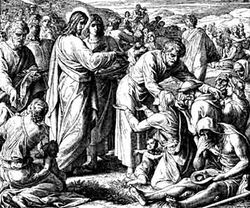
The early Christian ekklesia or called out Church was a republic that was recognized by Rome through the proclamation nailed to the cross by order of the Proconsul of Rome, Pontius Pilate. When Jesus rose from the dead to stand again upon the earth, so did His Kingdom. His kingdom now lives in the hearts of those who follow His way.
Men like John Wilson of Princeton see "public religion" as an alternate form to the weaker "civil religion" but were both top down. Benjamin Franklin's view of public religion was "from-the-bottom-up" having been heavily influenced by the rugged individualism of the frontier and the natural distaste for exercising authority that comes with a practice of personal responsibility which we see with men like David Crocket and Mr. Bunce.
Benjamin Franklin and many other founders who were not always moral in their own lives were simply advocating a need for private morality and virtue knowing full well that without them the U.S. Constitution would be ineffective for republican life it was to protect. They knew that despite the denominational and sectarian form their religious philosophies and eschatology took that there was common good and moral character to their teachings. But more important was their endeavor to aid one another in charitable service performed religion by voluntary acts of citizens rather than the top down authority of civil controls seen in the public religion or welfare of Rome which led to its decline and fall.
- "This essay conceptualizes the War on Poverty as a period during which public religious capacities were incorporated into the institutional apparatus of the national welfare state. Such incorporation largely served the political needs of the welfare state itself, as it needed not only to execute but also to justify social policy to a variety of publics, including black political movements. Welfare state expansion during this period occasioned the setting of a practical boundary between public and private religion."[13]
Private religion
- First, has the aspect of the performance of duty to man according to a righteous spirit of the divine dwelling of God within the individual and only relies of government to assist in protecting that right from intrusion, and
- Secondly, refers to expressions of religious faith by that behavior generated by private individuals through free assemblies within communities.
There is almost always a voluntary sector having direct bearings on public order, union and discipline.
The Church, as one form of government, provides public service as Benefactors of public religion without exercising authority over the people while both political and civil practices of religion involve compelled offerings directed by the states and extracted from the people from the top down.
As such, the terms Public or Civil religion serves to refer to one side while Private religion through the Church or other charitable institutions form the familiar private-public dichotomy.
Public religion centralizes power in the hands of the state an debilitates the fibrous nature of a virtuous society. Welfare should be privatized in order to tke care of the needy in a way that will strengthen society and make the best use of its resources. That is what Constantine was doing when he turned the temples of Rome over to private management like the Christians. But he failed to implement all the moral codes that comes along with Christ and the prophets.
- ↑ Robert Neelly Bellah was an American sociologist, and the Elliott Professor of Sociology at the University of California, Berkeley. He was internationally known for his work related to the sociology of religion. His magnum opus is, Religion in Human Evolution.
- ↑ Civil Religion in America GARY SCOTT SMITH
- ↑ American civil religion. ... American civil religion is a sociological theory that a nonsectarian quasi-religious faith exists within the United States with sacred symbols drawn from national history. Scholars have portrayed it as a cohesive force, a common set of values that foster social and cultural integration.
- ↑ [http://gradworks.umi.com/33/12/3312490.html Circa deos ac religiones: Religion and the Roman emperor from Augustus to Constantine by Polk, Matthew Robert, Ph.D., HARVARD UNIVERSITY, 2008, 412 pages; 3312490]
- ↑ Richard John Neuhaus, 1936 – 2009, prominent American clergyman.
- ↑ Matthew 11:12 And from the days of John the Baptist until now the kingdom of heaven suffereth violence, and the violent take it by force.
- ↑ Luke 16:16 The law and the prophets [were] until John: since that time the kingdom of God is preached, and every man presseth into it.
- ↑ Polybius: The Histories (composed at Rome around 130 BC) Fragments of Book VI, p289.
- ↑ “The real destroyers of the liberties of the people is he who spreads among them bounties, donations, and benefits.” Plutarch
- ↑ Social Contract, chapter 8, book 4
- ↑ Commonly cited as the principal architect of modern social science and father of sociology
- ↑ The Elementary Forms of the Religious Life, Book 1, Ch. 1. Émile Durkheim
- ↑ Rise of the Public Religious Welfare State: Black Religion and the Negotiation of Church/State Boundaries during the War on Poverty Omar M. McRoberts